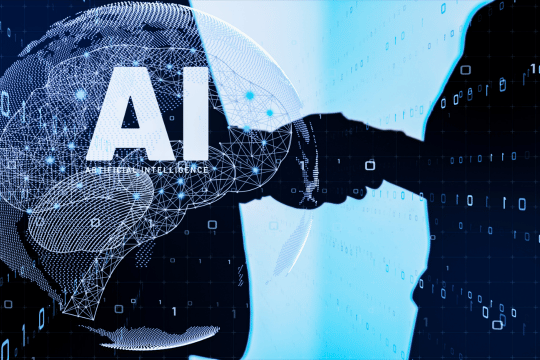Artificial intelligence (AI) has long been an integral part of everyday business life in Germany: 57% of companies are actively working with AI technologies and 20% are already using them productively ¹. The picture is similar across Europe: more than half of all companies are working intensively with AI, while 42% have firmly integrated it into their business processes ². The rapid spread is showing measurable success: nine out of ten European companies are recording increases in turnover or productivity through the use of AI ².
Small ESG teams in particular benefit from AI for sustainability
At the same time, the pressure on companies to implement sustainability strategies is growing. In addition to large companies, which are obliged to report on sustainability under the Corporate Sustainability Reporting Directive (CSRD), SMEs in particular are feeling the pressure to manage sustainability. Supply chain requirements and customer demands are reinforcing this trend.
At first glance, AI and sustainability seem to have little in common - after all, AI systems consume considerable amounts of energy and resources. But this assessment falls short of the mark. A study by the Capgemini Research Institute shows that AI-driven use cases have the potential to help companies achieve up to 45% of their emissions reduction target under the Paris Climate Agreement by 2030 ³.
The figure makes it clear that AI and sustainability complement each other surprisingly well when it comes to efficient and sustainable business. Smaller ESG teams in particular benefit from this combination, as AI automates complex sustainability processes and also supports resource-limited companies in their transformation.
The flip side: challenges with AI and sustainability
But even though AI has the potential to accelerate economic sustainability, we must not lose sight of the challenges it poses.
{{expert-tip}}
Resource consumption of AI
- Energy consumption: AI operations could increase the energy consumption of data centers to 90 TWh by 2026 - a tenfold increase compared to 2022 ⁴. Generative AI models consume hundreds to thousands of MWh per training run and individual queries consume 10 to 100 times more electricity than an internet search ⁴.
- Water consumption: Water consumption for cooling in data centers could reach 1.7 trillion gallons by 2027, with many data centers located in water-scarce regions ⁴.
- Electronic waste: The need for constant hardware updates leads to an annual increase in electronic waste of 3-12%, which could become problematic by 2030 ⁵.
Ethical and social challenges
In addition to the environmental impact, AI systems also entail other risks:
- Data protection and data security breaches: AI processes sensitive information, which can lead to concerns about data misuse.
- Bias and discrimination: AI algorithms can inherit biases from training data, which can lead to unfair treatment, especially in hiring processes.
- "Black box" problem: Lack of transparency, explainability and hallucinations of AI models impair their decision-making and confidence in their results.
Framework conditions for responsible AI
In order to minimize these risks and maximize the positive effects of AI, clear responsibilities and control mechanisms are required. The EU AI Act and ISO/IEC 42001 set high standards for transparency, bias detection and human oversight.
{{context-card}}
In concrete terms, this means for companies:
- Development of clear strategies for the responsible use of AI
- Investments in data protection technologies
- Comprehensive training for employees
- Continuous monitoring and evaluation of AI systems
Only through these measures can AI be used responsibly and develop its full potential for sustainability. And the potential is high: according to a study by the London School of Economics and Systemiq, AI could significantly reduce global carbon emissions. Researchers estimate that AI could reduce greenhouse gases by 3.2 to 5.4 billion tons annually by 2025. This reduction would far exceed the emissions caused by AI ⁶.
Practical applications: How AI and sustainability work in practice

Process optimization and resource efficiency
AI improves the efficiency of supply chains, avoids unnecessary routes and thus reduces emissions. By 2026, 60% of companies are expected to use AI-supported warehouse solutions to improve transparency and speed of response ⁷.
Energy and resource management
By optimizing energy systems and accelerating the integration of renewable energies, up to USD 110 billion can be saved annually in the operation and maintenance of power plants ⁸.
Circular economy
AI is accelerating the transition to circular business models, increasing resource efficiency and creating new value creation logics. This creates new potential, particularly in material flow and traceability.
Waste management and recycling
AI-controlled robots sort waste at a rate of up to 1,000 items per hour and significantly reduce contamination. This could increase the efficiency of recycling plants by 60% by 2030 ⁹.
Industry-specific solutions: AI and sustainability in practice
AI analyzes large amounts of data in real time, enabling precise, adaptive decisions with a lasting impact in various industries.
- Agriculture: Through precise planting strategies, soil analyses and weather data, AI reduces the use of water, energy and chemicals and supports climate-resilient agriculture.
- Smart cities: AI controls traffic flows, predicts traffic jams and improves energy, water and waste management via IoT systems and smart grids.
- Production & industry: AI reduces emissions, increases production yields and supports the development of recyclable, resource-saving products.
- Transport & logistics: route optimization, charging infrastructure for e-vehicles and intelligent transport systems make the sector significantly more efficient and sustainable thanks to AI.
- For companies of all sizes: AI is particularly valuable in the implementation of ESG strategies - e.g. through automated analyses, KPI suggestions or optimized sustainability communication. This makes sustainability scalable even without a large ESG team.
ESG compliance: How sustainability AI tools are revolutionizing your sustainability strategy
In addition to specific use cases, AI is a decisive factor for companies to effectively plan and implement their entire ESG strategy and meet compliance requirements. Sustainability AI tools help companies to implement these requirements automatically:
Automated data acquisition and validation
KIautomatically collects ESG data from a variety of sources such as texts, tables or emails and improves their quality. Data gaps are closed and inconsistencies in emissions or human rights data across different formats are identified and corrected.
Derive measures and manage implementation
Based on ESG data, sustainability AI tools identify relevant patterns, systematically assess risks and prioritize specific ESG measures, whether for decarbonization or for supplier evaluation. Whether electricity consumption in the office or complex Scope 3 risks: AI-supported systems suggest specific improvement steps and continuously monitor their progress.
Compliance and risk prevention
AI increases the transparency and traceability of ESG data and identifies potential risks at an early stage. It not only supports companies in complying with legal requirements, but also reduces the reporting effort and ensures verifiable sustainability information. For investors and stakeholders, this means more transparency about sustainable business practices, faster and more reliably.
Strategic approach: successfully implementing AI and sustainability
AI and sustainability are not opposites, but complement each other perfectly for sustainable business. While the challenges are real, the potential outweighs them - provided that companies take a strategic and responsible approach. Companies that invest in AI and sustainability now are positioning themselves optimally for the future.
"At Planted, we have a clear focus: only use AI where it has a real impact on sustainability and helps to reduce complexity. We concentrate on specific applications: automated KPI determination, ESG data analysis, sustainability reporting, CO₂ management. Every AI solution must make a measurable contribution to our customers' sustainability goals."
- Saša Redžepović, Senior Data Scientist at Planted
Would you like to get to know our AI-powered ESG software solution? Book a free demo now.
Sources:
¹ https://www.bitkom.org/Presse/Presseinformation/Erstmals-beschaeftigt-Haelfte-Unternehmen-KI
² https://www.aboutamazon.eu/news/innovation/ai-adoption-outpaces-early-mobile-phone-uptake
³ https://www.capgemini.com/de-de/insights/research/climate-ai/
⁴ https://www.deloitte.com/us/en/insights/industry/technology/technology-media-and-telecom-predictions/20 25/genai-power-consumption-creates-need-for-more-sustainable-data-centers.html
⁵ https://news.climate.columbia.edu/2025 /06/18/how-ai-is-revolutionizing-the-recycling-industry/
⁶ https://actu.ai/de/eine-studie-zeigt-dass-kunstliche-intelligenz-die-globalen-kohlenstoffemissionen-erheblich-reduzieren-kann-55923.html?utm_source=chatgpt.com
⁷ https://pmc.ncbi.nlm.nih.gov/articles/PMC1197 3334/
⁸ https://www.iea.org/reports/energy-and-ai/ai-fo r-energy-optimisation-and-innovatio
⁹ https://news.climate.columbia.edu/2025/06/18/how-ai-is-revolutionizing-the-recycling-industry/




.jpg)


